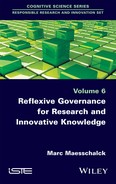0%
18Chapters
0-1Hours read
0kTotal Words
Table of Contents
- Cover
- Dedication
- Title
- Copyright
- Foreword
- Introduction
- 1 RRI and Governance Theory
- 2 The Origins of Governance Theory
- 3 Exploring Reflexive Governance Theory
- 4 Key Strengths of a Reflexive Theory of Governance
- 5 Promoting Reflexive Governance of RRI
- 6 Intellectual Intervention in Society: The Key to Reflexive Governance of RRI
- 6.1. The destiny of rationality in the construction of common interest
- 6.2. The fragmentation of knowledge
- 6.3. Contradiction and pluralization of real interests
- 6.4. From intellectual intervention to the community of destiny
- 6.5. The possible role of political philosophy
- 6.6. Long and short cycles of RRI governance
- 6.7. A new model for the institution of knowledge?
- Conclusion
- Bibliography
- Index
- End User License Agreement
